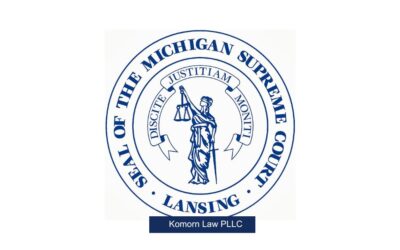A seizure may occur when a police vehicle partially blocks a defendant’s egress if the
totality of the circumstances indicate that a reasonable person would not have felt free to leave
In the case of People v Duff (July 26, 2024)., the Michigan Supreme Court issued an opinion regarding police seizure.
Background of the Case: Police officers observed a parked car with its engine running in an elementary school parking lot at 10:00 p.m. They parked their patrol car about ten feet behind the parked car at a 45-degree angle, with headlights and a spotlight directed at the car.
The officers approached the vehicle, detected signs of intoxication from the driver, and took him into custody following failed field sobriety tests. The driver later agreed to a blood draw and confessed to consuming alcohol.
Key Legal Issues: The defendant’s motion to suppress evidence of intoxication was denied by the Oakland Circuit Court, as it claimed the evidence was obtained through an unlawful seizure. The Court of Appeals also denied interlocutory leave to appeal.
The Michigan Supreme Court remanded the case to the trial court to determine when the defendant was first seized for Fourth Amendment purposes. On remand, the trial court granted the defendant’s motion to dismiss, finding that the defendant was seized when the patrol car parked behind him.
The Court of Appeals overturned the decision, stating that the defendant was not considered to be under seizure when the patrol car pulled up 10 feet away at a 45-degree angle.
Michigan Supreme Court Decision: A police vehicle blocking a defendant’s exit may constitute a seizure if a reasonable person would not feel free to leave based on the circumstances.
The Court determined that the defendant was seized prior to the officers detecting any signs of intoxication, taking into account the police behavior, timing, and environment.
The Court of Appeals’ decision was overturned, leading to a remand to assess if the officer had reasonable suspicion of criminal activity during the defendant’s initial seizure.
Read the opinion here:
Legal Counsel and Your Rights
When facing legal challenges, particularly in criminal cases, it is advisable to seek legal counsel immediately.
An experienced attorney can provide guidance on how to navigate interactions with law enforcement while safeguarding your constitutional rights.
Since 1993 our expert legal defense in navigating criminal law matters and protecting your constitutional rights are what we eat for breakfast everyday.
Contact Komorn Law PLLC if you’re ready to fight and win.
Research us and then call us.
More Rights You Should Know

The Michigan Supreme Court has ruled they have the right to ban guns
July 27, 2018 - The Michigan Supreme Court has ruled that the Ann Arbor and Clio school districts have a right to ban guns from their schools In a very much watched case that deals a blow to gun rights advocates who argued state law prohibits schools from...

Supreme Court Opinion – Created federal agencies need judicial oversight
Summary of the Opinion in Loper Bright Enterprises v. RaimondoIn Loper Bright Enterprises v. Raimondo, the Supreme Court addressed the enduring precedent set by Chevron U.S.A., Inc. v. Natural Resources Defense Council, Inc., which has shaped administrative law for...
Other Articles
Michigan Supreme Court to Hold Public Administrative Hearing
On September 18, 2024, the Michigan Supreme Court will conduct a public administrative hearing, providing an opportunity for citizens and legal professionals to engage directly with the state's highest court. This hearing, held via Zoom and livestreamed on YouTube,...
Nuclear waste headed to southeast Michigan landfill
What happened to the nuclear waste from the Manhattan Project? It's coming to Michigan so New York can be a cleaner place.August 2024, the U.S. Army Corps of Engineers is transporting nuclear waste from the Manhattan Project (Read it) to the Wayne Disposal facility in...
Video kept from family shows police force not drugs killed son
police and paramedics inflicted “inhumane acts of violence”A mother has filed a federal lawsuit claiming that, while her son was experiencing a seizure in his Tennessee apartment, police and paramedics inflicted “inhumane acts of violence” on the 23-year-old instead...
What could happen when you click the – I agree – box?
Wrongful death suit against Disney serves as a warning to consumers when clicking ‘I agree’A wrongful death lawsuit involving Walt Disney Parks and Resorts highlights the critical importance for consumers to meticulously review the fine print before registering for a...
4th Circuit says – Assault weapons can be banned
This case is about whether the Act’s general prohibition on the sale and possession of certain “assault weapons,” are unconstitutional under the Second Amendment. An en banc federal appeals court upheld Maryland’s ban on assault-style weapons in a 10-5 decision...
Court Ruling – No bonus for growing weed
COURT RULING – SORRY NO BONUS FOR GROWING CANNABISA marijuana farm worker is unable to succeed in his breach-of-contract lawsuit regarding a $100,000 bonus he claims to be owed for producing a healthy harvest of 1400 pounds of dry cannabis crop as the contract is...
SCOTUS – Justices uphold laws targeting homelessness
Does not amount to “cruel and unusual punishment” under the Eighth Amendment The Supreme Court has affirmed the validity of ordinances in a southwest Oregon city that restrict individuals experiencing homelessness from utilizing blankets, pillows, or cardboard boxes...
Michigan Crime Victim Compensation
Michigan has a crime victim compensation fund. You can contact them using the various links on this page. This post is just to provide you with information. We do not provide any services for this topic.Crime Victims Victims of crime often face lasting repercussions...















